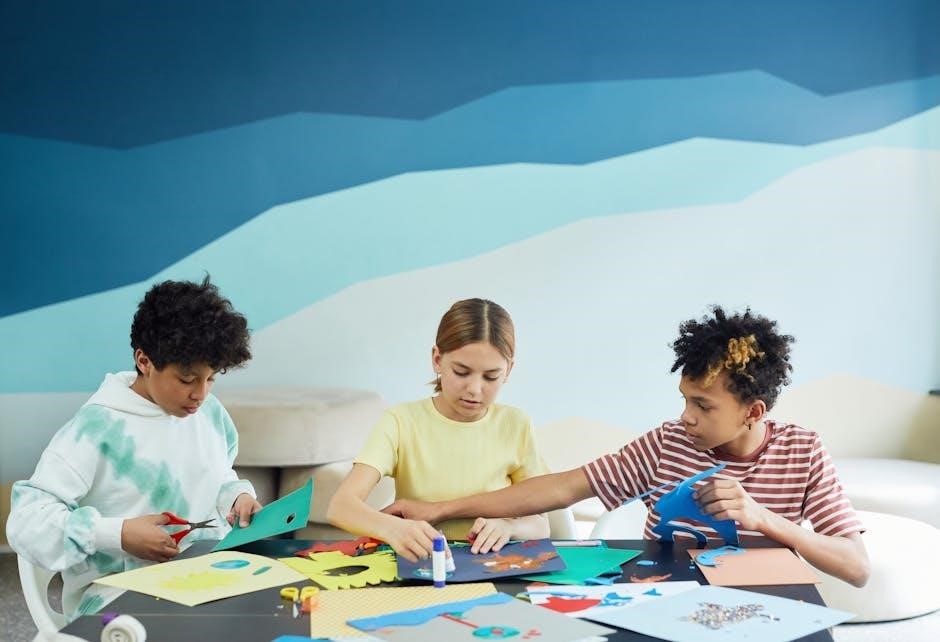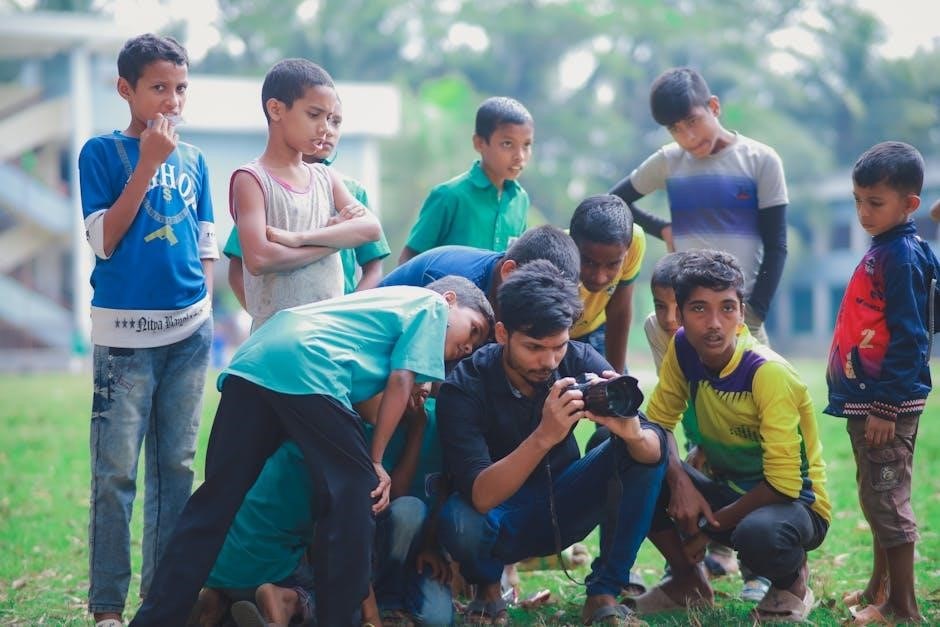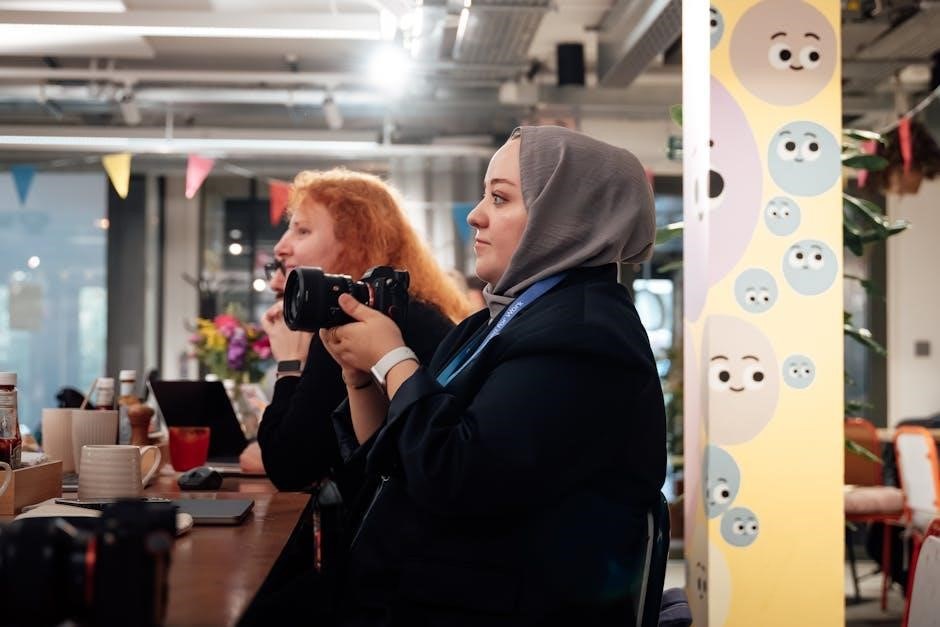Social skills are crucial for effective communication and building strong relationships. They enhance emotional well-being and contribute to personal and professional growth.
1.1 What Are Social Skills?
Social skills are essential abilities that enable effective interaction and communication with others. They include verbal and non-verbal behaviors, such as active listening, empathy, and understanding social cues. These skills help individuals navigate relationships, resolve conflicts, and maintain harmony in personal and professional settings. Strong social skills foster emotional intelligence, problem-solving, and cooperation, making them vital for building meaningful connections and achieving personal goals.
1.2 Importance of Social Skills in Daily Life
Social skills are vital for fostering positive interactions, building strong relationships, and achieving personal and professional success. They enable effective communication, conflict resolution, and empathy, which are essential in both personal and workplace settings. Strong social skills enhance emotional intelligence, helping individuals navigate diverse social situations with confidence. They also promote collaboration, problem-solving, and mutual respect, making them indispensable for a fulfilling and harmonious life. Developing these skills can significantly improve overall well-being and opportunities in various aspects of life.

Understanding Social Skills Development

Social skills are learned through observation, practice, and interaction. Environment and culture shape their development, influencing how individuals communicate and navigate relationships effectively in various contexts.
2.1 How Social Skills Are Learned
Social skills are primarily learned through observation, imitation, and practice. Children often mimic behaviors they see in parents, teachers, and peers. Positive reinforcement, such as praise, encourages repetition of constructive actions. Conversely, negative experiences can hinder skill development. Structured activities, like role-playing, also play a significant role in refining these abilities. Over time, consistent exposure and feedback help individuals master essential interpersonal competencies, which are vital for building strong, healthy relationships throughout life.
2.2 The Role of Environment and Culture
Environment and culture significantly influence social skills development. Cultural norms dictate appropriate behaviors, while surroundings shape interaction styles. For instance, collectivist cultures emphasize harmony, fostering cooperative behaviors, whereas individualist cultures may prioritize assertiveness. Family dynamics and community values further mold these skills. Exposure to diverse environments broadens understanding of social cues, enhancing adaptability. Recognizing these influences is key to tailoring development strategies, ensuring individuals can navigate varied social contexts effectively and respectfully.

Key Components of Social Skills
Social skills encompass communication, emotional intelligence, and active listening. These components foster effective interactions, empathy, and strong relationships, essential for personal and professional success.
3.1 Communication Skills
Communication skills are the foundation of social interactions, involving verbal and non-verbal expression. Effective communication includes active listening, clarity in speech, and appropriate body language. These skills help convey ideas clearly, build rapport, and avoid misunderstandings. Worksheets and exercises in social skills PDFs often focus on improving communication, offering practical activities like conversation starters and role-playing. Such resources are particularly beneficial for children, adults, and individuals with special needs, fostering confident and meaningful interactions in various social settings.
3.2 Emotional Intelligence
Emotional intelligence (EI) is the ability to recognize, understand, and manage one’s emotions and those of others. It plays a crucial role in social skills, fostering empathy, self-awareness, and healthy relationships. High EI helps individuals navigate conflicts, communicate effectively, and build trust. Social skills PDFs often include exercises to enhance EI, such as emotion identification activities and empathy-building worksheets. These resources are invaluable for individuals of all ages, promoting emotional regulation and improving social interactions in diverse settings.
3.3 Active Listening
Active listening is a vital social skill that involves fully concentrating on and comprehending others’ messages. It requires maintaining eye contact, nodding, and asking clarifying questions. This skill helps build trust, resolve conflicts, and strengthen relationships. Social skills PDFs often include exercises to improve listening, such as role-playing activities and reflection worksheets. By practicing active listening, individuals can better understand others’ perspectives, fostering empathy and effective communication in both personal and professional settings.
Improving Social Skills
Improving social skills involves practical exercises, role-playing, and self-reflection. Worksheets and guides from social skills PDFs offer effective methods to enhance communication and relationship-building abilities.
4.1 Worksheets and Exercises for Social Skills
Worksheets and exercises are excellent tools for improving social skills, offering structured activities to enhance communication, emotional intelligence, and problem-solving. Designed for various audiences, including children, adults, and individuals with special needs, these resources often cover topics like conversation starters, active listening, and personal space. Many are available as free, downloadable PDFs, providing practical and reflective learning opportunities. They help users practice and refine their abilities in real-world scenarios, fostering confidence and better social interactions.
4.2 Role-Playing and Practical Activities
Role-playing and practical activities are dynamic ways to enhance social skills through real-life simulations. These exercises allow individuals to practice interactions in a safe, controlled environment, building confidence and competence. Activities like group projects, scenario acting, and problem-solving tasks encourage active participation and teamwork. They cater to diverse learning styles, helping individuals with special needs, children, and adults alike. These methods foster a deeper understanding of social cues and behaviors, making them highly effective for skill development and real-world application.
Social Skills for Specific Groups
Social skills development is tailored for specific groups, including children, adults, and individuals with special needs, offering targeted strategies and resources to enhance their interactions effectively.
5.1 Social Skills for Children
Teaching social skills to children is essential for their emotional and psychological development. Worksheets, games, and activities help kids learn communication, empathy, and problem-solving. These tools guide children in understanding social norms, initiating conversations, and managing emotions. Resources like printable checklists and activity books provide structured learning experiences, fostering positive interactions and confidence. By incorporating these methods, parents and educators can help children build strong social foundations, leading to healthier relationships and a smoother transition into adulthood.
5.2 Social Skills for Adults
Social skills for adults are vital for personal and professional success. They enhance communication, emotional intelligence, and relationship-building. Adults can improve these skills through structured worksheets, role-playing, and practical exercises found in PDF guides. Resources like activity books and downloadable checklists focus on areas such as active listening, conflict resolution, and emotional regulation. These tools help adults navigate workplace interactions, build stronger connections, and maintain emotional well-being, ensuring they thrive in both personal and professional environments with confidence and clarity.
5.3 Social Skills for Individuals with Special Needs
Social skills training for individuals with special needs is tailored to their unique requirements. Worksheets, activity books, and downloadable guides offer structured exercises to enhance communication, emotional regulation, and interpersonal interactions. Resources often include visual aids, role-playing scenarios, and real-life situation practice. These tools help individuals with autism, ADHD, and other conditions develop confidence in social settings. They focus on skills like initiating conversations, understanding boundaries, and problem-solving, providing a supportive framework for meaningful connections and personal growth.

Free Social Skills PDF Resources
Discover a variety of free social skills PDF resources, including worksheets, activity books, and guides, designed to help individuals of all ages improve their interpersonal abilities effectively.
6.1 Recommended Worksheets and Activity Books
Explore a wide range of free social skills PDF worksheets and activity books designed to enhance communication, emotional intelligence, and interpersonal interactions. Resources like The Social Success Workbook for Teens and 101 Ways to Teach Children Social Skills offer practical exercises. These materials cater to children, adults, and individuals with special needs, providing activities on topics such as conversation starters, active listening, and problem-solving. Downloadable guides are available to help users reflect on their skills and improve social interactions effectively.
6.2 Downloadable Guides and Checklists
Downloadable guides and checklists are invaluable tools for assessing and improving social skills. Resources like the 66 Social Skills for Kids Checklist and The Social Success Workbook for Teens provide structured frameworks. These guides often include exercises for emotional regulation, conversation starters, and problem-solving scenarios. Checklists help identify strengths and areas for growth, offering a clear roadmap for development. They are ideal for educators, parents, or individuals seeking to enhance their social competence in a structured and measurable way.
Mastery of social skills enhances relationships and personal growth. Utilize the provided resources, such as worksheets and guides, to foster confidence and effective communication in various settings.

7.1 Final Thoughts on Mastering Social Skills
Social skills are essential for fostering meaningful connections and achieving personal growth. By practicing active listening, emotional intelligence, and effective communication, individuals can navigate various social situations confidently. Utilizing resources like worksheets and activity books can further enhance these abilities. Continuous learning and adaptability are key to mastering social skills, ensuring personal and professional success. Embrace these tools and strategies to cultivate strong, lasting relationships and a fulfilling social life.
Additional Resources
Explore books, online courses, and community workshops for further learning. Resources like The Social Success Workbook for Teens and 101 WAYS TO TEACH CHILDREN SOCIAL SKILLS are highly recommended.
8.1 Books and Online Courses
Enhance your learning with books like The Social Success Workbook for Teens and 101 Ways to Teach Children Social Skills. Online courses offer interactive lessons tailored for various needs, including nonverbal learning disorders and emotional intelligence. These resources provide practical activities and science-based exercises to improve communication, problem-solving, and relationship-building skills. They cater to both children and adults, ensuring comprehensive development of social competence in diverse settings.
8.2 Community Support and Workshops

Community support and workshops provide valuable opportunities to practice social skills in group settings. Local organizations often host workshops focused on role-playing, emotional intelligence, and conflict resolution. These interactive sessions allow individuals to learn from others and receive feedback. Additionally, support groups offer a safe space for sharing experiences and strategies. Many communities also provide free downloadable resources, such as checklists and activity guides, to complement workshop learning. Engaging in these programs fosters confidence and practical social skills in real-life scenarios.
